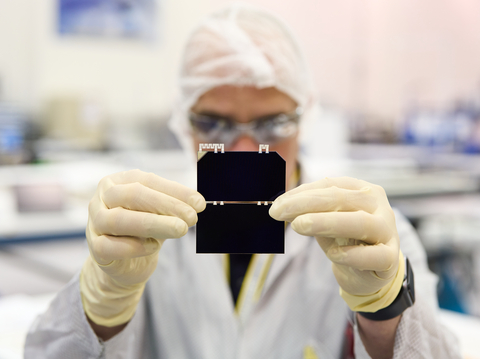Rocket Lab Signs Preliminary Terms to Receive up to $23.9M in Funding Under the CHIPS Act to Expand Production of Semiconductors that Power Spacecraft
Rocket Lab announced the signing of a preliminary memorandum of terms with the Department of Commerce to receive up to $23.9M under the CHIPS Act. This funding will expand Rocket Lab's semiconductor production for spacecraft at its New Mexico facility, creating over 100 jobs. The company, which acquired SolAero Technologies in 2022, is one of two U.S. producers of space-grade solar cells. These cells power critical space missions like NASA’s Artemis and the James Webb Space Telescope. The expansion aims to boost production by 50% in three years, meeting growing demand for national security and commercial satellites. New Mexico will also provide $25.5M in additional support. This move is part of a broader U.S. effort to bolster domestic semiconductor manufacturing.
- Rocket Lab to receive up to $23.9M in funding under the CHIPS Act.
- Expansion will create over 100 direct manufacturing jobs in New Mexico.
- Production of space-grade solar cells to increase by 50% within three years.
- Additional $25.5M support from the State of New Mexico.
- Strengthens U.S. supply chain for critical semiconductors.
- Key technology for national defense and security satellites.
- Supports booming commercial satellite market.
- Funding is based on a non-binding preliminary memorandum of terms.
- Actual award amounts and terms are subject to due diligence and negotiation.
- Conditional on the achievement of certain milestones.
Insights
The proposed funding of up to
From a financial perspective, this expansion is likely to lead to additional revenue from both government and commercial space programs. Increased production capacity means Rocket Lab can fulfill more orders and potentially negotiate larger contracts. Furthermore, the creation of over 100 direct manufacturing jobs can reduce unemployment levels in Albuquerque, thereby improving the local economy and potentially leading to more robust community support and investment in Rocket Lab's technologies.
This funding aligns with Rocket Lab's strategic goals to solidify its position in the space technology sector and its impact on the stock could be positive in the short term due to the anticipation of revenue growth and improved operational capacity. However, investors should also consider the costs associated with the expansion and modernization efforts to ensure that the return on investment justifies the outlay. The mention of additional state financial assistance worth
Overall, for investors, this funding can be seen as a positive indicator for Rocket Lab's future earnings potential and market standing.
The semiconductor market, particularly for space applications, is becoming increasingly critical due to growing demand for national security systems and commercial satellite constellations. Rocket Lab's receipt of funding under the CHIPS Act aligns with the broader industry trend of reshoring semiconductor manufacturing to the U.S. to reduce dependency on foreign production, which is a strategic move given the current geopolitical climate.
This investment will likely support Rocket Lab in meeting the rising demand for space-grade solar cells, which are essential for a variety of advanced space missions including defense and commercial ventures like the OneWeb broadband internet satellite constellation. By increasing its production capacity, Rocket Lab can cater to this booming market more effectively, potentially gaining a significant competitive edge over its limited number of competitors outside Russia and China.
Additionally, the move towards modernizing and expanding facilities in Albuquerque not only fortifies Rocket Lab's production capabilities but also emphasizes the company's commitment to enhancing U.S. supply chain resilience, which is a key concern for many stakeholders.
In summary, this funding is likely to bolster Rocket Lab's market position and competitiveness significantly.
From a technological standpoint, expanding the production of compound semiconductors, particularly space-grade solar cells, is a significant move for Rocket Lab. Space-grade solar cells are highly efficient and radiation-resistant, which are vital for sustaining long-term space missions and ensuring the functionality of critical space assets such as the James Webb Space Telescope and NASA's Artemis lunar explorations.
This expansion not only enhances Rocket Lab's technological capabilities but also places the company in a stronger position within the niche market of space-grade semiconductors. The increased production capacity can lead to advancements in their existing technologies and potentially foster innovations that could set new industry standards.
Moreover, having a robust domestic manufacturing setup for these components mitigates risks associated with international supply chain disruptions. These technological advancements contribute to national security by ensuring that the U.S. has reliable access to high-performance components for its defense and space exploration programs.
In essence, this initiative not only scales Rocket Lab's production but also solidifies its technological edge in the space sector.
The proposed investment would enable Rocket Lab to further expand in

Rocket Lab Signs Preliminary Terms to Receive up to
Rocket Lab acquired SolAero Technologies Inc in 2022, making Rocket Lab one of only two companies domestically, and three companies outside of
This proposed CHIPS investment would help create a more robust and resilient supply of space-grade solar cells. The modernization and expansion project would also increase Rocket Lab’s compound semiconductor production by
In addition to these proposed federal incentives, the
"Semiconductors are central to modern life, to our economy, and to America's future. We are proud to be strengthening that future with the support of the CHIPS Office by expanding our production facilities to meet growing demand for the semiconductors that power the nation's most critical science, defense and commercial space missions," said Rocket Lab founder and CEO, Sir Peter Beck. "For more than two decades the SolAero team, now part of Rocket Lab, has played a crucial role in the domestic production of semiconductors. This program is a continuation of our commitment to ensuring resilient
“Rocket Lab has called
“This major investment from our CHIPS and Science Act will further solidify New Mexico’s role as a leader in advanced manufacturing and create more than an estimated 100 manufacturing jobs. It will also further cement our state as the best place in America to manufacture novel technologies with emerging space defense applications,” said Senator Heinrich, a member of the 2022 Chips and Science Act Conference Committee. “For years now, I’ve been proud to bolster New Mexico’s bases, defense research labs, and private industry partners so we can keep excelling in emerging defense fields. That includes supporting the growth of SolAero, now Rocket Lab—a homegrown
“I am so excited that SolAero will get almost
“These 100-plus good-paying jobs will support hard-working New Mexicans, while strengthening our national security through domestic semiconductor manufacturing,” said Rep. Gabe Vasquez. “This funding for Rocket Lab will help ensure that vital semiconductors are made in America and solidify
“Not only will this
Rocket Lab has indicated that it plans to claim the Department of the Treasury’s Investment Tax Credit, which is expected to be up to
+ About CHIPS for America
CHIPS for America is part of President Biden’s economic plan to invest in America, stimulate private sector investment, create good-paying jobs, make more in
+ About Rocket Lab
Founded in 2006, Rocket Lab is an end-to-end space company with an established track record of mission success. We deliver reliable launch services, satellite manufacture, spacecraft components, and on-orbit management solutions that make it faster, easier, and more affordable to access space. Headquartered in
+ Forward Looking Statements
This press release contains forward-looking statements within the meaning of the Private Securities Litigation Reform Act of 1995. We intend such forward-looking statements to be covered by the safe harbor provisions for forward looking statements contained in Section 27A of the Securities Act of 1933, as amended (the “Securities Act”) and Section 21E of the Securities Exchange Act of 1934, as amended (the “Exchange Act”). All statements contained in this press release other than statements of historical fact, including, without limitation, statements regarding our launch and space systems operations, launch schedule and window, safe and repeatable access to space, Neutron development, operational expansion and business strategy are forward-looking statements. The words “believe,” “may,” “will,” “estimate,” “potential,” “continue,” “anticipate,” “intend,” “expect,” “strategy,” “future,” “could,” “would,” “project,” “plan,” “target,” and similar expressions are intended to identify forward-looking statements, though not all forward-looking statements use these words or expressions. These statements are neither promises nor guarantees, but involve known and unknown risks, uncertainties and other important factors that may cause our actual results, performance or achievements to be materially different from any future results, performance or achievements expressed or implied by the forward-looking statements, including but not limited to the factors, risks and uncertainties included in our Annual Report on Form 10-K for the fiscal year ended December 31, 2023, as such factors may be updated from time to time in our other filings with the Securities and Exchange Commission (the “SEC”), accessible on the SEC’s website at www.sec.gov and the Investor Relations section of our website at www.rocketlabusa.com, which could cause our actual results to differ materially from those indicated by the forward-looking statements made in this press release. Any such forward-looking statements represent management’s estimates as of the date of this press release. While we may elect to update such forward-looking statements at some point in the future, we disclaim any obligation to do so, even if subsequent events cause our views to change.
View source version on businesswire.com: https://www.businesswire.com/news/home/20240611596553/en/
+ Rocket Lab Media Contact
Morgan Connaughton
media@rocketlabusa.com
Source: Rocket Lab USA, Inc.







